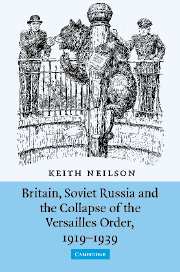Book contents
- Frontmatter
- Contents
- Acknowledgements
- List of abbreviations
- Introduction
- 1 The period of persuasion: British strategic foreign policy and Soviet Russia, 1919–1933
- 2 1933–1934: parallel interests?
- 3 A clash of sensibilities: January to June 1935
- 4 Complications and choices: July 1935–February 1936
- 5 Soviet Russian assertiveness: February 1936–July 1937
- 6 Chamberlain's interlude: May 1937–September 1938
- 7 Chamberlain as Buridan's ass: October 1938–September 1939
- Conclusion
- Appendix I
- Appendix II
- Appendix III
- Bibliography
- Index
Conclusion
Published online by Cambridge University Press: 18 July 2009
- Frontmatter
- Contents
- Acknowledgements
- List of abbreviations
- Introduction
- 1 The period of persuasion: British strategic foreign policy and Soviet Russia, 1919–1933
- 2 1933–1934: parallel interests?
- 3 A clash of sensibilities: January to June 1935
- 4 Complications and choices: July 1935–February 1936
- 5 Soviet Russian assertiveness: February 1936–July 1937
- 6 Chamberlain's interlude: May 1937–September 1938
- 7 Chamberlain as Buridan's ass: October 1938–September 1939
- Conclusion
- Appendix I
- Appendix II
- Appendix III
- Bibliography
- Index
Summary
The inter-war period was above all a period of transition in British strategic foreign policy. Great Britain was caught between nineteenth-century concepts of the balance of power, the experimentation that was collective security and old-fashioned alliance diplomacy. The impact of Soviet Russia on this transition was algebraic: the country was a factor in the equation of British strategic foreign policy generally, but it was rarely the dominant one. Soviet Russia's isolation from world affairs for much of the period meant that it remained a looming presence on the periphery of British thinking about how to maintain the new world order that emerged after 1919. However, it was a significant periphery. Soviet Russia both threatened the status quo and acted – at least potentially and on occasion – as one of its guardians. This gave Soviet Russia a dual role in British thinking. The ideological menace of communism imperilled the British Empire and, to a lesser extent, even Britain itself, but the military might of Soviet Russia acted as a possible deterrent to both Nazi Germany's and militarist Japan's expansion.
This book has endeavoured to do two things. Its primary aim has been to examine British strategic foreign policy. That goal has been pursued by means of using Britain's interactions with Soviet Russia as a case study for the entire topic – to provide the ‘bore-hole’ into British policy.
- Type
- Chapter
- Information
- Publisher: Cambridge University PressPrint publication year: 2005

